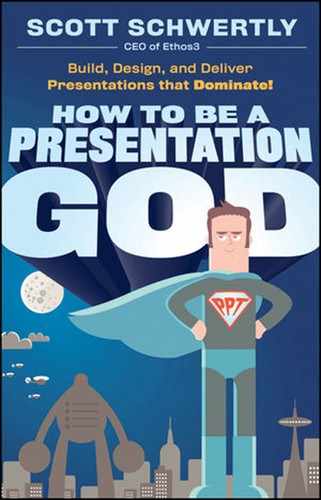3.2. BE FLEXIBLE
I'll warn you that new software will come out, new technologies will be developed, and audiences will doubtlessly change. They'll laugh at different jokes and find pleasure in emerging trends. If you are reading this book to find a list of current presentation skills that you can ride all the way into retirement, I have some very bad news.
We are not looking at trends; we are looking at principles. What kinds of ideas and approaches have resonated with audiences for centuries? How does the brain learn? How do the ears listen? What makes a person feel and do something? Answering these questions will revolutionize the world by drawing ideas and the people that put them into practice together more tightly than ever before. If we learn the principles, we can easily adapt to the trends. It's the difference between giving a good presentation and becoming a presentation god. Permanence and longevity are the measuring sticks.
Perhaps nothing illustrates principles-based learning better than the Tao Te Ching, an ancient Chinese text written by Lao Tzu that has influenced Eastern philosophy and religion for centuries. Stemming from the belief that everything in the natural world reflects unchanging, universal truths, the Tao Te Ching asked rulers and common people alike to be observant students of the world around them.
In an obvious, yet poignant, observation, Lao Tzu notices that those objects that are inflexible tend to break: "Gentle and yielding is the principle of life/Thus an Army without flexibility never wins a battle." Some withstand more force than others, but the slight and bending reed survives high winds better than the tall and rigid tree.
The lesson here is obvious: Be flexible. Follow the principles of good business, good politics, and good living. Recognize that forming relationships, caring about others, and providing perspective are standards of living that also go very well in your presentation, no matter its design style. We are a technical society: when we see a problem, we try to fix it. Rarely do we look within to consider the values we represent, yet nothing could be more vital when trying to motivate a group of people to act.
I say this because someone is inevitably going to spend hours developing a story, agonizing over the design, and perfecting the delivery of their presentation—only to walk into the venue and discover that the projector bulb is out, or a child replaced a memory card with a crayon, or that the airline didn't deliver their lost luggage on time. Though that person isn't responsible for whatever catastrophe has befallen their presentation, it will be their fault: an audience will show up nonetheless, and a presentation must be given. If we learn the principles that allowed Abe Lincoln, without PowerPoint, to connect with Americans at Gettysburg, or that let Churchill, sans laser pointer, to connect with the embattled and broken English people, then we'll know exactly what to do when that time comes.

A person can rise to the top of a company by developing an energetic and hilarious presentation style. But life is always changing. What happens when that humorous individual has to deliver a eulogy? What about hunger and war? If your only aspiration is to sell magician capes until you're filthy rich, life will eventually show you that you're needed for far more. Presentations can certainly be hilarious, but they need to provide strength and love and hope, too. Aspire to be all things to all people. There's no shortage of need for the aforementioned qualities.
If all we learn is a few canned story ideas, two or three fonts, and a favorite arm gesture or facial expression, we'll fall faster than Icarus with wings on fire. Again, be flexible. Focus on the principles and apply the tools. The omniscient view—the view that doesn't change, that never settles—is expansive. That kind of perspective requires that you open your heart enough to touch another person and be humble enough to step out of your experience and into someone else's. The irony of humility is that it determines your level of success, which will come if you expand your horizons and begin to engage with your audience. Practice flexibility by remaining open to new ideas and, more importantly, trying them out. I promise that you'll experience the thrill of discomfort and that you'll see results.
Lao Tzu also said, "A man with outward courage dares to die/A man with inward courage dares to live." Start taking bold steps to revolutionize the way you communicate. Science is increasing life expectancy, but not by that much. We have a short while to live among each other. Isn't it time we started making the most of our words and actions?
